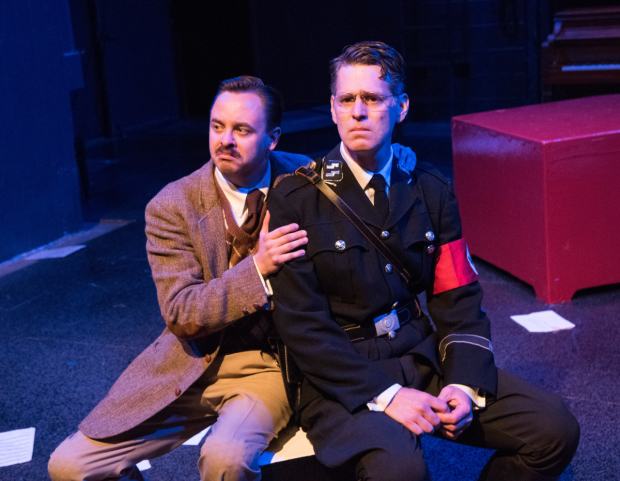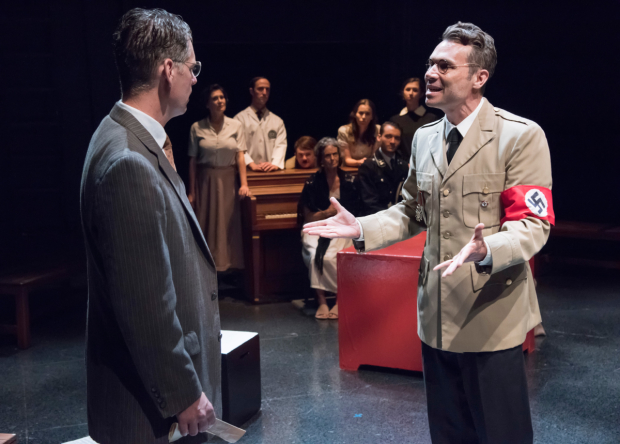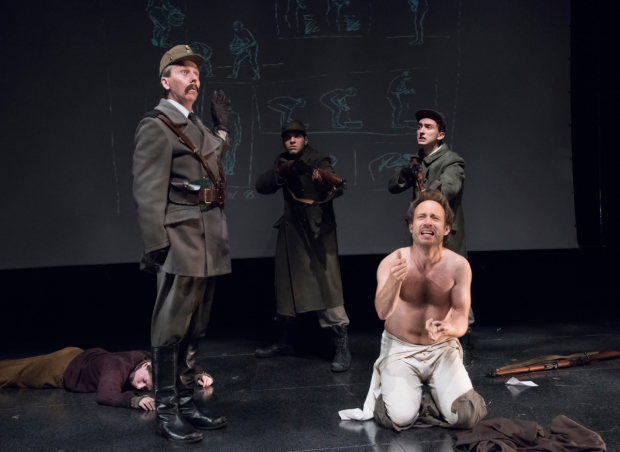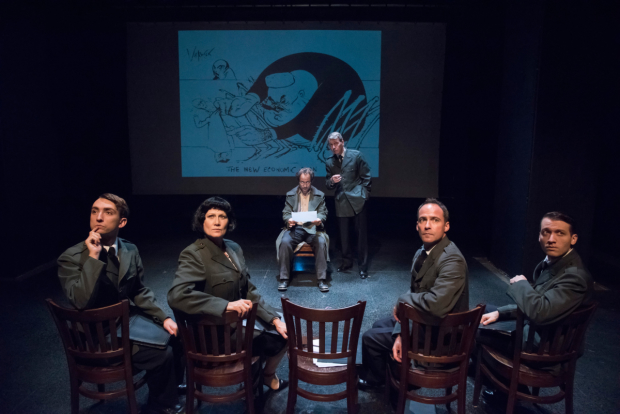Good and No End of Blame

(© Stan Barouh)
Potomac Theatre Project offers revivals of two unsettlingly timely plays: C.P. Taylor's Good and Howard Barker's No End of Blame, which are being performed in repertory at Atlantic Stage 2. Set in the early mid-20th century, both works eerily seem to speak to our own moment. In case there was any doubt of that, the company includes a Donald Trump quote before a timeline of the Third Reich in the show program. It's a somewhat heavy-handed juxtaposition, appropriate for the blunter (and less effective) of the two plays.
Set in Germany immediately following the rise of Hitler, Taylor's Good follows John Halder (Michael Kaye), a German literature professor whose casual distaste for Nazi race-baiting eventually gives way to full S.S. membership and a post at Auschwitz. Taylor attempts to explain this transformation with the help of auxiliary characters like Halder's exhausting wife (Valerie Leonard playing the only recognizably fleshed out character in the play), his beautiful student/mistress (Caitlin Rose Duffy), and his Jewish therapist (Tim Spears). The promise of professional advancement and personal comfort weigh heavily on Halder's mind, but is that a good enough reason to become a Nazi? Despite strenuous storytelling, it is easy to emerge from this production more confused than when it began.

(© Stan Barouh)
Staging on Mark Evancho's austere set of wooden benches and rehearsal blocks, director Jim Petosa occasionally achieves moments that are both beautiful and terrible in their theatricality, as when the ensemble spontaneously combusts into a pyre for books to the sound of Pilgrim's Chorus from Tannhäuser (well-curated, muscular sound design from Seth Clayton). Mostly, the actors stand around aimlessly as one scene bleeds into the next. Moments of levity (like a high-kicking Hitler) land with a thud, leaving us to feel as though we're witnessing bargain-brand Brecht.
Kaye's detached, somewhat tongue-in-cheek portrayal of Halder keeps us at arm's length, preventing us from ever really empathizing with this middle-class academic-turned-fascist. The result is a presentation of Nazis that is just as alien and sinister as any Spielberg film.

(© Stan Barouh)
Barker's No End of Blame is unquestionably the more impactful of the two plays. It charts the life of Hungarian political cartoonist Bela Veracek (based loosely on real-life cartoonist Victor Weisz) in a meaningfully sympathetic way without succumbing to sentimentality. Over the course of half a century (from the end of World War I to the mid-'60s), Veracek (Alex Draper) wanders from the war-torn Carpathians to Budapest, Moscow, and eventually London in search of a place to freely create his bitingly critical drawings. He never finds it.
"Vera" (his pen name) possesses an unflinching ability to sniff out the hypocrisy in each society he inhabits, a power that makes him a brilliant artist, but not a very pleasant person to be around: He loses his wife, Ilona (Stephanie Janssen) and best friend, Grigor (David Barlow) in pursuit of his work. Barker gets beyond the cliché of the uncompromising artist in a scene in which Vera's publishers at Britain's Daily Mirror yield to the demands of wartime censors while he agonizingly looks on in silence. As bitter as this capitulation is to swallow, Vera goes on to draw a paycheck as a British newspaper cartoonist for the next 20 years. As Barker shows, it is not just potential Nazis who worry about paying the bills.
Draper's performance (prominently featuring a sly smile and observant eyes) makes Vera downright likable, no easy task considering the play opens with him committing an attempted rape (and successful murder). We understand Vera as a tangle of contradictions, a man trying to stay honest in a world that makes it impossible.
Richard Romagnoli directs the Hungarian characters to speak in a baseline American dialect in their scenes with each other. They adopt thick Hungarian accents around Russians or Brits. The convention works, hammering home Vera's foreignness while simultaneously making him very relatable.

(© Stan Barouh)
Evancho's set for No End of Blame is just as spartan as the one for Good, but looks less like a rehearsal studio. The upstage wall features a screen for Vera's cartoons (hauntingly imagined by Gerald Scarfe for the original 1981 production at London's Royal Court). Danielle Nieves' costumes are effective at establishing time and place, with only a few egregious distractions (Comrade #4's communist lady wig looks like it was extracted from an Edna Mode costume bag at Halloween Adventure).
Between the character in Good dismissing Hitler's anti-Semitic rhetoric as political posturing to win votes from the uneducated masses, and the characters in No End of Blame trying to stifle Vera's criticism (while reiterating their commitment to free speech), you will find something in these two plays that makes you think of 2016. Still, if you can only see one, choose No End of Blame.










